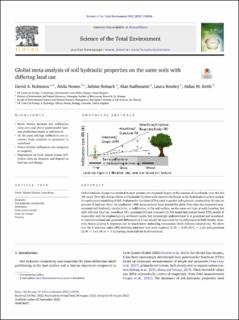| dc.contributor.author | Robinson, David A. | |
| dc.contributor.author | Nemes, Attila | |
| dc.contributor.author | Reinsch, Sabine | |
| dc.contributor.author | Radbourne, Alan | |
| dc.contributor.author | Bentley, Laura | |
| dc.contributor.author | Keith, Aidan M. | |
| dc.date.accessioned | 2023-06-06T06:32:45Z | |
| dc.date.available | 2023-06-06T06:32:45Z | |
| dc.date.created | 2022-09-16T10:42:40Z | |
| dc.date.issued | 2022 | |
| dc.identifier.citation | Science of the Total Environment. 2022, 852 1-10. | |
| dc.identifier.issn | 0048-9697 | |
| dc.identifier.uri | https://hdl.handle.net/11250/3070016 | |
| dc.description.abstract | Global land use change has resulted in more pasture and cropland, largely at the expense of woodlands, over the last 300 years. How this change affects soil hydraulic function with regard to feedbacks to the hydrological cycle is unclear for earth system modelling (ESM). Pedotransfer functions (PTFs) used to predict soil hydraulic conductivity (K) take no account of land use. Here, we synthesize >800 measurements from around the globe from sites that measured near-saturated soil hydraulic conductivity, or infiltration, at the soil surface, on the same soil type at each location, but with differing land use, woodland (W), grassland (G) and cropland (C). We found that texture based PTFs predict K reasonably well for cropland giving unbiased results, but increasingly underestimate K in grassland and woodland. In native woodland and grassland differences in K can usually be accounted for by differences in bulk density. However, heavy grazing K responses can be much lower indicating compaction likely reduces connectivity. We show that the K response ratios (RR) between land uses vary with cropland (C/W = 0.45 [W/C = 2.2]) and grassland (G/W = 0.63 [W/G = 1.6]) having about half the K of woodland. | |
| dc.language.iso | eng | |
| dc.title | Global meta-analysis of soil hydraulic properties on the same soils with differing land use | |
| dc.title.alternative | Global meta-analysis of soil hydraulic properties on the same soils with differing land use | |
| dc.type | Peer reviewed | |
| dc.type | Journal article | |
| dc.description.version | publishedVersion | |
| dc.source.pagenumber | 1-10 | |
| dc.source.volume | 852 | |
| dc.source.journal | Science of the Total Environment | |
| dc.identifier.doi | 10.1016/j.scitotenv.2022.158506 | |
| dc.identifier.cristin | 2052381 | |
| dc.relation.project | Norges forskningsråd: 325253 | |
| cristin.ispublished | true | |
| cristin.fulltext | original | |
| cristin.qualitycode | 2 | |
